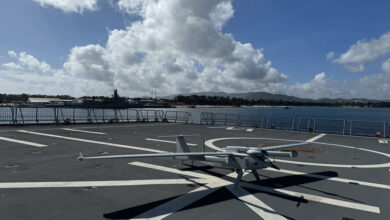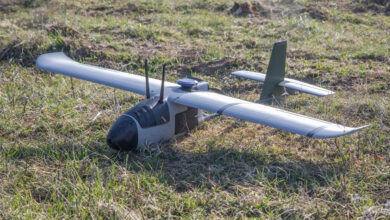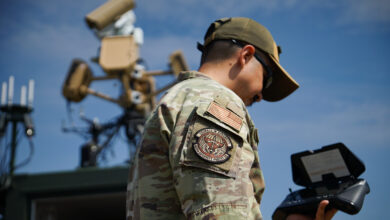Iraq investigating strike on Kataib Hezbollah near Syria border
The Iraqi military said on Monday, August 26 that it has launched an investigation into an alleged strike that killed one Hashd al-Shaabi fighter and severely wounded another near a desert border crossing with Syria, renewing fears of a potential proxy war in the country.
Sunday’s attack struck vehicles belonging to the 45th Brigade, the Iraqi government’s official designation for the Iran-backed Kataib Hezbollah militia, which operates as a part of the Iraqi armed forces.
“An investigation is ongoing now to determine what happened with the strike,” Iraq’s military spokesman Yehya Rasool told AFP.
In a statement Sunday, Hashd al-Shaabi (Popular Mobilization Units) blamed two Israeli drones for launching the strike on Brigade 45 personnel some 15 km (10 miles) from the Syrian border.
The statement alleged the strike was carried out under U.S. air cover and that “a large surveillance balloon” was spotted nearby.
It also acknowledged the attack coincided with the onset of the fourth phase of Operation Will of Victory, an Iraqi Army operation to root out Islamic Sleeper cells in remote areas. Both U.S. aircraft and Hashd militias have partaken in the operation, but do not coordinate positions with each other directly.
The attack killed Kazem Mohsen, the 45th Brigade’s “logistical support chief” who was also known by his nom de guerre Abu Ali al-Dabi.
Hundreds mourned at a funeral procession for Mohsen in Baghdad on Monday morning, including Ahmad al-Assadi, a member of parliament and spokesman for Iraq’s parliamentary Fatah Alliance bloc, which represents the PMU.
“We will work in the coming days to hold an emergency parliamentary meeting to discuss this issue and take the appropriate decisions,” he said in a video published by the Hashd.
Kataib Hezbollah is known to traverse the al-Qaim border crossing into eastern Syria. In June 2018, one of the militia’s positions was struck near the eastern Syrian border city of Al Bukamal, resulting in several dead.
The U.S. military denied responsibility for that attack. A White House official later told CNN that Israel had conducted the strike.
Sunday’s attack is the latest in a series of unexplained explosions at Hashd positions across Iraq since mid-July, for which no party has claimed responsibility.
Israel has conducted hundreds of airstrikes against what it says are Iran-linked targets in Syria, including on Sunday near Damascus to prevent an alleged drone attack, but has not claimed credit for any strikes in Iraq.
Asked earlier this month about the incidents in Iraq, Israeli Prime Minister Benjamin Netanyahu said his government would “act against [Iran] whenever necessary.”
The U.S. has accused Iran-backed groups of transporting missile systems into Syria via Iraq to target Israel, and said it supports Israeli strikes in Syria, but U.S. Central Command has denied any involvement in the explosions in Iraq.
Iraq’s Fatah coalition, which represents the PMUs in parliament, said Sunday it holds the U.S. “fully responsible” for what it called “Zionist aggressions … which we consider a declaration of war on Iraq, its people and its national sovereignty.”
“We believe that there is no need for the American presence [in Iraq], which claims to provide air protection, but instead their presence is cover for Zionist attacks,” the Fatah statement read.
The Iraqi government has carried out investigations into some of those incidents, blaming an unidentified drone for an explosion at a Hashd base in Amerli on July 19 and saying another was a “premeditated” act. It has not made any specific accusations or published the full results of the probes.
U.S. officials told Associated Press and the New York Times earlier this week that the explosion in Amerli was caused by an Israeli airstrike.
Iraq’s foreign ministry said it would wait for official conclusions before taking action at the United Nations.
“If it was proven that a foreign entity was involved in these operations, we will take all steps – first among them, going to the Security Council and the United Nations,” spokesman Ahmad Sahhaf said.
Hashed deputy chief Abu Mahdi al-Muhandis, who is on a U.S. terrorism blacklist, unequivocally blamed the U.S. last week. Muhandis, the long-time leader of Kata’ib Hezbollah, is linked to Iran’s Islamic Revolutionary Guard Corps.
Muhandis accused the U.S. of allowing Israeli drones into Iraq, but Sunday’s attack was the first time Hashd officials have directly accused Israel of conducting a strike.
The Hashd al-Shaabi militias were organized in 2014 from disparate armed groups and volunteers to fight Islamic State, which had swept through a third of Iraqi territory.
Baghdad now pays PMU fighters salaries equal to those it pays the Iraqi Army and has worked to integrate them under its central control as part of Iraq’s official security forces.
On the ground, however, the militias are largely influenced by local commanders and by Muhandis.
The Trump administration designated the IRGC a terrorist organization earlier this year amidst its “maximum pressure” sanctions campaign against Iran, which the U.S. accuses of expansionist activities in the region.
More than 5,000 U.S. troops remain in Iraq, where they are training and advising Iraqi security forces to combat remnants of the Islamic State.
The Trump administration considers Iran-linked PMU groups the greatest threat to American troops in Iraq, and has said it will hold Iran accountable for any threats posed by the militias.
Also on Monday, a pro-Syrian government Palestinian group, the Popular Front for the Liberation of Palestine, accused Israel of carrying out a drone attack on one of its positions in eastern Lebanon.
With reporting from AFP












